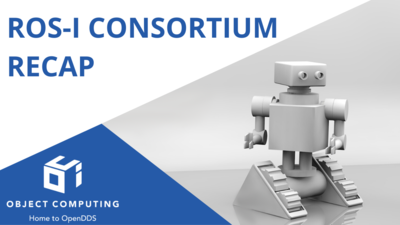
On March 4, 2020, our team attended the ROS-I Americas Annual Meeting, which took place in San Antonio, Texas.
ROS-Industrial (ROS-I) is an international consortium promoting open-source projects that extend the advanced capabilities of Robot Operating System (ROS) to manufacturing automation and robotics.
Notable topics on the agenda included the advancements being made within the Robot Operating System (ROS2), an open-source, meta-operating system for robots.
ROS is an open-source, meta-operating system for robots. It provides the services you would expect from an operating system, including hardware abstraction, low-level device control, implementation of commonly-used functionality, message-passing between processes, and package management.
While the functionality and tools available within ROS are impressive, the system was designed to control a single robot from a desktop environment. Its performance and scalability cannot keep pace with the needs of next-gen robotics applications, such as autonomous vehicles and multi-robot swarms. New applications require real-time performance with safety-critical implications, as well as seamless operation in distributed environments often characterized by limited memory and unreliable networking.
The industry needed a next-gen redesign of ROS that addressed limitations that could not have been foreseen when the technology was originally designed. ROS2 represents a significant upgrade to the original system.
A key element of the upgrade is the adoption of DDS as the connectivity framework. DDS is an open-standard connectivity framework for real-time systems that enables distributed systems to operate securely as an integrated whole. The addition of DDS technology to ROS2 enables new capabilities across distributed robotics systems.
Application developers and architects looking for a standards-based, publish-subscribe DDS solution suitable for robotics systems will find that OpenDDS, the leading open source implementation of the DDS specification, enables superior application connectivity and portability, backed by unparalleled service and support from Object Computing.
Learn more about OpenDDS in our upcoming, introductory training workshop.
